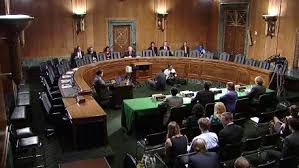Day Two – Hearing Response From Military University Professors
SANTA BARBARA, CA – The Palm Center released a statement by eighteen current and former faculty members at Service Academies and Military Universities, responding with factual evidence to claims made at today’s second round of Senate Armed Services Committee Hearing on “don’t ask, don’t tell.”
Statement by Current and Former Military Professors
Unprecedented claims: The Chiefs made several unprecedented claims today. (1) General Casey said that the premise of the 1993 “don’t ask, don’t tell” law is no longer correct, in that the presence of a gay service member in a unit no longer undermines cohesion. (2) General Amos said that concerns about retention and recruiting are unwarranted. (3) Several of the Chiefs confirmed that Chaplain attrition rates will be low, and that sponsoring denominations will continue to sponsor Chaplains subsequent to repeal. (4) Generals Amos and Casey said that the Pentagon Working Group was correct in declining to include a survey question as to whether or not the troops want “don’t ask, don’t tell” to be repealed.
Unit cohesion: The preponderance of evidence shows that concerns about repeal’s potential impact on combat readiness and unit cohesion will not translate into actual problems. Data include 1) the experiences of foreign militaries; 2) paramilitary federal agencies such as the CIA; 3) police and fire departments; 4) the U.S. military’s history of sending known gay and lesbian service members into war; and 5) statistical analysis which shows that among combat troops, there is no relationship between knowing a gay peer and the reported readiness or cohesion of a unit.
Distinctiveness of combat arms: While combat arms are unique in terms of mission and culture, there is no evidence that the 25 foreign militaries that allow gays and lesbians to serve encountered unique difficulty among combat troops. Many of these forces, such as the British, Israelis, Canadians and Australians, are combat-tested. Even though opposition to repeal is higher in the combat arms than other sectors of the U.S. military, this does not mean that repeal will translate into operational problems. Canadian Lieutenant General Walter Semianiw said that, “I state this unequivocally here, there is no negative impact on operational effectiveness. There has been no impact to reflect on operational effectiveness by having men and women of any sexual orientation fighting together, be it in Afghanistan, from what we’ve seen, be it in Iraq, be it on many key peacekeeping missions over the many, many years.”
Costs of the status quo: Discussion at today’s hearing was devoted to the risks of repeal, but little attention was devoted to the costs and risks of the status quo. Research shows that “don’t ask, don’t tell” imposes twelve different types of cost on the military such as wasting talent and undermining cohesion. A Blue Ribbon Commission found that the financial cost of discharging gays and lesbians during the first decade of “don’t ask, don’t tell” was, conservatively, more than $300 million. Discussions of risk associated with policy transition should include consideration of the costs and risks of the status quo: http://unfriendlyfire.org/research/files/report.pdf
Foreign military differences: Claims were advanced about the distinctiveness of foreign military situations, in particular the notion that foreign militaries that allow gays and lesbians to serve decided to do so at a time of greater national consensus than currently exists in the U.S., and after decisions were made to allow gay and lesbian civil unions. Polls show that approximately two-thirds of the American public want to allow gay men and lesbians to serve openly. Allies such as Britain, Canada, Australia, France, Germany, Denmark, the Netherlands and Israel did not allow gay civil unions prior to the repeal of military bans.
Multitasking while at war: While it is true that after almost a decade at war, the military is stretched thin and uniquely focused on combat, it is not true that such focus precludes resolution of other issues. For example, the military planned and instituted service-wide sexual assault policy and training in 2005 and 2006 which, according to one Navy memo, “requires extensive, in-depth training for Navy personnel and specialized training for commanders.” From 2004 to 2006, the military planned and instituted service-wide policy and training with respect to combating trafficking in persons. From 2008 to 2010, the military planned and instituted service-wide suicide prevention policy and training. All of these initiatives were conducted during wartime.
Signatories:
- Professor John T. Ackerman, Air Command and Staff College*
- Professor Frank J. Barrett, Naval Postgraduate School*
- Lt. Col. Allen Bishop, USA (ret.), former professor, U.S. Military Academy at West Point*
- Professor Donald Campbell, U.S. Military Academy at West Point*
- Dr. Kathleen M. Campbell, U.S. Military Academy at West Point*
- Professor Martin L. Cook, Naval War College*
- Lt. Col. Edith A. Disler, USAF (ret.), former professor, U.S. Air Force Academy*
- Professor Morten Ender, U.S. Military Academy at West Point*
- Professor Mark Eitelberg, Naval Postgraduate School*
- Professor Craig A. Foster, U.S. Air Force Academy*
- Professor Gregory D. Foster, National Defense University*
- Professor Elizabeth L. Hillman University of California Hastings College of the Law, former instructor, United States Air Force Academy*
- Professor Janice H. Laurence, Temple University, and former professor, Industrial College of the Armed Forces*
- Professor George Lucas, U.S. Naval Academy*
- Professor George R. Mastroianni, United States Air Force Academy*
- Professor George Reed, University of San Diego, former Director of Command and Leadership Studies, U.S. Army War College*
- Professor Steven M. Samuels, U.S. Air Force Academy*
- Professor Richard Schoonhoven, U.S. Military Academy*
*The views expressed by faculty at US Government Agencies are those of the individuals and do not necessarily reflect the official policy or position of their Service, the Department of Defense, or the U.S. Government. Non-military institutional affiliations are listed for identification purposes only, and do not convey the institutions’ positions.
